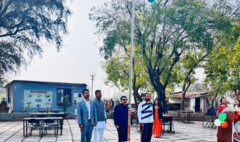Disaster Management Workshop on 14th July 2023
Disaster Management Workshop on 14th July 2023
The Disaster Management Workshop, organized by the NSS (National Service Scheme) Wing of Sabarmati University, aimed to enhance the knowledge and skills of faculty members and students in disaster preparedness, response, and recovery. The workshop provided participants with hands-on experience, practical training, and valuable insights into effective disaster management strategies. The workshop was graced by Provost I/C, Dr. Kirit Vyas, Registrar, Dr. Jyoti Srivastava, Dean Academics, Prof. (Dr.) Parshuram Dhaked, NSS Programme Officer, Mr. Kunal Patawari and NSS Programme Coordinators, Dr. Dilip Chaudhari and Dr. Priyanka Kumari Bhatt.
Workshop Objectives:
The workshop aimed to achieve the following objectives:
– To raise awareness about disaster management and its significance in society.
– To equip participants with practical skills and knowledge related to disaster preparedness, response, and recovery.
– To foster a sense of responsibility and preparedness among faculty members and students.
– To provide a platform for sharing experiences, best practices, and innovative approaches to disaster management.
Workshop Details:
The Disaster Management Workshop was held on 14th July 2023 at Sabarmati University in Ahmedabad. The workshop was attended by a diverse group of faculty members and students who showed a keen interest in disaster management and community service.
Workshop Structure:
The workshop was structured to offer a comprehensive learning experience. It consisted of the following components:
– Presentations: Mr. HP Patel, Director of IHRDC, delivered informative presentations on various aspects of disaster management, including risk assessment, emergency planning, and post-disaster recovery.
– Hands-on Training: Faculty members and students actively participated in practical exercises and simulations related to disaster response. They were given the opportunity to handle and familiarize themselves with various rescue equipment.
– Drills: Participants engaged in drill sessions to practice response strategies and coordination during emergency situations. These drills allowed them to simulate real-life scenarios and develop their problem-solving skills.
Key Points:
During the workshop, the following key points were emphasized:
– Importance of disaster preparedness and early warning systems.
– Techniques for effective communication and coordination during emergencies.
– Basic first aid and medical assistance in disaster situations.
– Strategies for search and rescue operations.
– Management of evacuation centers and relief distribution.
Guest Instructor:
Mr. HP Patel, an experienced professional and Director of the IHRDC, served as the main instructor for the workshop. His expertise and guidance greatly contributed to the participants’ understanding and learning.
Participant Engagement and Feedback:
The participants actively engaged in the workshop activities, demonstrating enthusiasm and eagerness to learn. They actively participated in hands-on training, drills, and group discussions. Feedback from the participants highlighted their appreciation for the practical approach of the workshop, as it allowed them to apply their knowledge and skills in realistic scenarios.
Outcomes and Achievements:
The Disaster Management Workshop resulted in several outcomes and achievements:
– Enhanced knowledge and understanding of disaster management concepts and strategies among the participants.
– Increased practical skills related to handling rescue equipment and implementing response techniques.
– Strengthened collaboration and coordination among faculty members and students in disaster management efforts.
– Raised awareness and preparedness within the university community for potential future disasters.
Conclusion:
The Disaster Management Workshop organized by the NSS Wing of Sabarmati University was a resounding success. The hands-on experience, practical training, and active participation of faculty members and students contributed to their preparedness and understanding of disaster management. The workshop not only equipped the participants with valuable skills but also fostered a sense of responsibility and readiness within the university community. It is recommended that similar workshops be conducted periodically to ensure continued preparedness and resilience in the face of potential disasters.
Overall, the workshop served as a stepping stone toward building a safer and more disaster-resilient campus and community.







